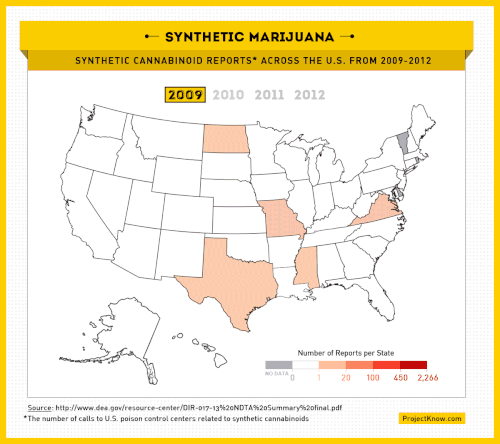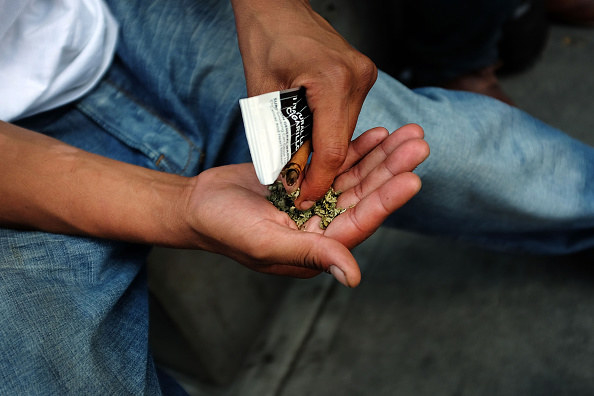 |
| Advertisement |
People in the Chicago area have been hospitalized because they were coughing up blood, or had severe nose bleeds, blood in the urine, or bleeding gums.
At least 38 people in and around Chicago, Illinois, have had severe bleeding linked to synthetic cannabinoids, which is also known as synthetic marijuana.

Synthetic cannabinoids are sometimes called synthetic pot, Spice, K2, and fake weed. The products are illegal, but may be sold in gas stations, convenience stores, and on the internet, and could be labeled "not for human consumption."
Of the 38 cases in the Chicago area and in central Illinois, one person has died and three have tested positive for exposure to brodifacoum, which is a blood-thinning drug used as a rat poison. All have been hospitalized because they had uncontrollable bleeding including coughing up blood, blood in the urine, severe bloody noses, or bleeding gums.
Brodifacoum is a powerful anticoagulant, said Alfred Aleguas Jr., the managing director of the Florida Poison Information Center in Tampa, Florida. It's similar in action to the blood-thinning drug warfarin, which is used medically to treat people at high risk for blood clots. However, warfarin is used carefully and monitored to prevent abnormal bleeding in patients, he said.
“Brodifacoum is what they call 'super warfarin,'" he told BuzzFeed News. It's used as a rat poison, and is better known to poison control centers as a source of self-inflicted poisoning.
"This is the first time we’ve ever seen it used as a contaminant in a drug of abuse," Aleguas said.
However, synthetic cannabinoids can be dangerous and deadly on their own, even when not contaminated with a poison. While synthetic cannabinoids may look like marijuana, they are in fact manmade chemicals that are sprayed on plant material, which is then smoked to get high or sold as a liquid, vaporized, and inhaled in an e-cigarette.
The Washington Post / Getty Images
Synthetic cannbinoids don't actually have much in common with plant-based cannabis. Here's why they can be so dangerous.

"It’s important to note that the term 'synthetic pot' is a misnomer, it’s not an accurate description of the products," said Dr. Michael Baumann, chief of the Designer Drug Research Unit of National Institute on Drug Abuse.
Although it looks like pot, it's actually plants that have been sprayed with "bioactive, manmade chemicals that bind to cannabinoid receptors in the brain to exert their effects," he added.
"These chemicals are not related to THC in their structure," he told BuzzFeed News. "THC is the active ingredient of marijuana. These chemicals are actually unique in their structure."
And outbreaks caused by synthetic cannabinoids aren't uncommon, he said, including a recent one in Indianapolis.
"It’s usually the same kind of thing where we have a localized area where a lot of people become sickened by a product similar to what you are seeing in Chicago," he told BuzzFeed News. "What’s unique about these Chicago incidents is the bleeding issue so that makes this particular episode unique."
Synthetic cannabinoids were first seen in Germany about 10 years ago, according to Dr. David A. Gorelick, professor of psychiatry at the University of Maryland School of Medicine in Baltimore.
"People were coming into emergency rooms, not just with temporary anxiety or a panic attack or transient psychosis, but with severe psychosis that required hospitalization," Gorelick told BuzzFeed News.
Unlike plant-based cannabis, side effects can be severe with synthetic cannabinoids, including kidney damage, muscle damage, seizures, and the need for antipsychotic medication.
"Whatever you think about plant cannabis, synthetic cannabinoids are definitely medically and psychiatrically dangerous," Gorelick said.
The drugs have spread around the world because they tend to be inexpensive and can't be detected on standard drug tests.
Spencer Platt / Getty Images
Some people are more likely to use them than others.

Synthetic cannabinoids are addictive, according to the National Institute on Drug Abuse. While greater awareness has helped reduce the chance that young people will try them, certain segments of the population are more likely to use them, Baumann said.
"For example, prison inmates and parolees, because the substances can be used without detection," he said. "You can’t really pick them up with the normal drug screen."
Medical Daily / Via giphy.com
Anyone who has a reaction to synthetic cannabinoids should call 911 or have someone take them to the emergency department immediately, according to the Illinois Department of Health.

In addition, the national Poison Help Hotline is (800) 222-1222, or you can text POISON to 797979 to save the number in your phone.
Spencer Platt / Getty Images


0 comments: